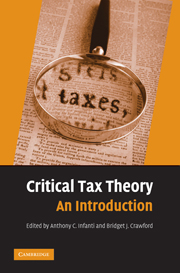Book contents
- Frontmatter
- Contents
- List of Illustrations
- List of Tables
- List of Contributors
- List of Common Abbreviations
- Introduction
- CHAPTER 1 FOUNDATIONS OF CRITICAL TAX THEORY
- CHAPTER 2 HISTORICAL PERSPECTIVES ON TAXATION
- CHAPTER 3 THE GOALS OF TAX POLICY
- CHAPTER 4 CRITICAL TAX THEORY MEETS PRACTICE
- CHAPTER 5 RACE AND TAXATION
- CHAPTER 6 GENDER AND TAXATION
- CHAPTER 7 SEXUAL ORIENTATION AND TAXATION
- CHAPTER 8 THE FAMILY AND TAXATION
- CHAPTER 9 CLASS AND TAXATION
- CHAPTER 10 DISABILITY AND TAXATION
- CHAPTER 11 GLOBAL CRITICAL PERSPECTIVES ON TAXATION
- CHAPTER 12 CRITICAL PERSPECTIVES ON CRITICAL TAX THEORY
- Index
Introduction
Published online by Cambridge University Press: 04 August 2010
- Frontmatter
- Contents
- List of Illustrations
- List of Tables
- List of Contributors
- List of Common Abbreviations
- Introduction
- CHAPTER 1 FOUNDATIONS OF CRITICAL TAX THEORY
- CHAPTER 2 HISTORICAL PERSPECTIVES ON TAXATION
- CHAPTER 3 THE GOALS OF TAX POLICY
- CHAPTER 4 CRITICAL TAX THEORY MEETS PRACTICE
- CHAPTER 5 RACE AND TAXATION
- CHAPTER 6 GENDER AND TAXATION
- CHAPTER 7 SEXUAL ORIENTATION AND TAXATION
- CHAPTER 8 THE FAMILY AND TAXATION
- CHAPTER 9 CLASS AND TAXATION
- CHAPTER 10 DISABILITY AND TAXATION
- CHAPTER 11 GLOBAL CRITICAL PERSPECTIVES ON TAXATION
- CHAPTER 12 CRITICAL PERSPECTIVES ON CRITICAL TAX THEORY
- Index
Summary
Tax law is political. That is a fundamental assumption of critical tax theory. Critical tax scholars ask why the tax laws are the way they are and what impact tax laws have on historically disempowered groups, such as people of color; women of all colors; lesbian, gay, bisexual, and transgendered individuals; low-income and poor individuals; the disabled; and nontraditional families. Far from being an organized “movement,” however, critical tax theory is a label that applies loosely to the work presented in this volume.
Though working mostly independently of one another, these scholars have all been influenced by the seismic intellectual shifts in the legal academy that occurred from the 1970s through the 1990s, namely, the critical legal studies movement and its progeny – critical race theory, feminist legal theory, and queer theory. Scholars working in those fields encouraged investigation into the law's unrevealed biases. They sought to demonstrate how accepted understandings of the law are constructed and contingent. They inspired both their contemporaries and those who work in their wake – including critical tax theorists – to question aspects of the law that might otherwise seem normal, natural, or plainly incontestable.
In the last fifteen years, there has emerged a small but steady stream of scholarship that, taken together, constitutes an incipient body of “critical tax scholarship.” Specialty law reviews and journals have played a key role in bringing this new generation of critical analysis to the marketplace of ideas. This book, however, is the first to present critical tax scholarship as a distinct mode of inquiry.
- Type
- Chapter
- Information
- Critical Tax TheoryAn Introduction, pp. xxi - xxivPublisher: Cambridge University PressPrint publication year: 2009



